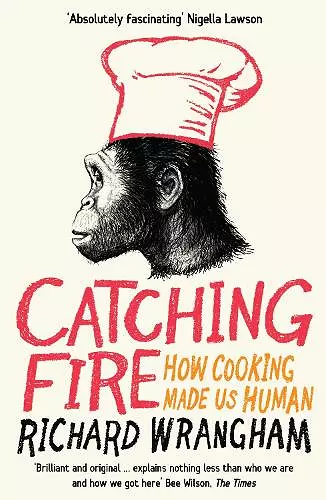Catching Fire
How Cooking Made Us Human
Format:Paperback
Publisher:Profile Books Ltd
Published:27th May '10
Should be back in stock very soon

'Absolutely fascinating' Nigella Lawson
Argues that it was cooking that caused the transformation of our ancestors from apelike beings to Homo erectus. This title focuses on the idea: the habit of eating cooked rather than raw food permitted the digestive tract to shrink and the human brain to grow, helped structure human society, and created the male-female division of labour.In this stunningly original book, Richard Wrangham argues that it was cooking that caused the extraordinary transformation of our ancestors from apelike beings to Homo erectus. At the heart of Catching Fire lies an explosive new idea: the habit of eating cooked rather than raw food permitted the digestive tract to shrink and the human brain to grow, helped structure human society, and created the male-female division of labour. As our ancestors adapted to using fire, humans emerged as "the cooking apes". Covering everything from food-labelling and overweight pets to raw-food faddists, Catching Fire offers a startlingly original argument about how we came to be the social, intelligent, and sexual species we are today. "This notion is surprising, fresh and, in the hands of Richard Wrangham, utterly persuasive ... Big, new ideas do not come along often in evolution these days, but this is one." -Matt Ridley, author of Genome
Toothsome, skillfully prepared brain food. -- Dwight Garner * New York Times *
How exciting to see a distinguished scholar proving unequivocally that cookery is at the centre of our humanity -- Sam Clark, Moro
As easily digested as the cooked food it champions ... This book packs the punch of a Tournedo Rossini with the lightness of a foam infusion * Allegra McEvedy, Guardian chef-in-residence *
Enthralling * Bookseller *
Catching Fire offers a startlingly original argument about how we came to be the social, intelligent, and sexual species we are today. Richard Wrangham argues that it was cooking that caused the extraordinary transformation of our ancestors from apelike beings to Homo erectus. At the heart of Catching Fire lies the groundbreaking new theory that the habit of eating cooked rather than raw food made us human. More than language, emotional intelligence, or the opposable thumb, the mastery of fire created us. Once our ancestors began cooking their food, the human digestive tract began to shrink and the brain to grow. Time once spent chewing tough raw food could be used instead to hunt and to tend camp. Cooking became the basis for pair bonding and marriage, created the household and even led to a sexual division of labour. -- The Judges of the BBC Samuel Johnson Prize 2010
Good public anthropology. With its balance of storytelling and coherently explained data, the book will enjoy a deservedly wide readership... Catching Fire, with its treasure trove of great stories, makes for pleasurable consumption -- Barbara J King * Times Literary Supplement *
Wrangham is doing no small thing here; he's putting forward - in the most accessible way - his big new theory... Fascinating stuff, convincingly argued -- Holly Kyte * Sunday Telegraph *
A breakthrough in evolutionary biology * Daily Telegraph *
Intriguing... You need never feel guilty about opting for pie over salad again * Metro *
Daringly unorthodox * Sunday Times *
His lucid theory is most persuasive * Independent *
Immensely enjoyable * Guardian *
This is one of the best popular science books I've ever read -- William Leith * Evening Standard *
A completely new theory about how we got where we are. Vindicates cuisine as never before - and will put you off raw food diets forever * Evening Standard Summer Reading *
A compelling and intriguing argument. Brain food at its best -- Antonia Senior * The Times Summer Reading *
His lucid theory is most persuasive -- Christopher Hirst * Independent *
Ingenious * Daily Express *
I have always believed that cooking is what makes us civilised, but until reading this I hadn't realised this was true at some deeper, actually anthropological level. Wrangham's argument, delivered with a lucidity that is a rare pleasure in an academic, is that it wasn't until our early ancestors stopped subsisting on raw food and began to cook it, thus providing more concentrated fuel, that our brains grew, becoming more sophisticated, and society developed. Wrangham makes his case with brio; this is as unputdownable as a thriller! -- Nigella Lawson * Waterstone's Books Quarterly *
Wrangham's argument is rigorous and compelling. You would have to be an A-grade, gold medal-winning, premier league arse of mammoth proportions to dismiss it as bunk. -- Jay Rayner * Observer *
[A] fascinating study... Wrangham's lucid, accessible treatise ranges across nutritional science, paleontology and studies of ape behavior and hunter-gatherer societies; the result is a tour de force of natural history and a profound analysis of cooking's role in daily life. * Publishers Weekly, starred review *
An innovative argument that cooked food led to the rise of modern Homo sapiens.... Experts will debate Wrangham's thesis, but most readers will be convinced by this lucid, simulating foray into popular anthropology. * Kirkus Reviews *
Catching Fire' is a plain-spoken and thoroughly gripping scientific essay that presents nothing less than a new theory of human evolution...one that Darwin (among others) simply missed. * The New York Times *
Wrangham draws together previous studies and theories from disciplines as diverse as anthropology, biology, chemistry, sociology and literature into a cogent and compelling argument. * The Washington Post *
A new theory of human evolution - 'the cooking hypothesis' - is related in plain-spoken, gripping language. * The New York Times Book Review *
Fascinating ... If Wrangham's thesis is right, we really are what we eat -- Heston Blumenthal * Independent *
- Short-listed for BBC Four Samuel Johnson Prize for Non-Fiction 2010 (UK)
ISBN: 9781846682865
Dimensions: 196mm x 128mm x 28mm
Weight: 220g
320 pages
Main